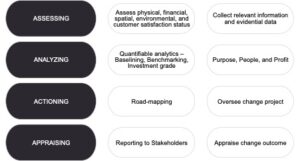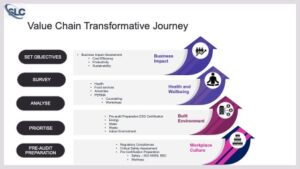The term value chain refers to the various business activities and processes involved in creating a product or performing a service. A value chain can consist of multiple stages of a product or service’s lifecycle, including research and development, sales, and everything in between. The concept was conceived by Harvard Business School Professor Michael Porter in his book The Competitive Advantage: Creating and Sustaining Superior Performance. – Harvard Business School Online
In the context of Integrated Facilities Management services, the growing preference for an outsourcing model necessitates a comprehensive evaluation of fundamental and value-added service offerings to facilitate strategic business advancements for property owners and stakeholders. Viewed from the perspective of FM services, the encompassed focus pertains to PEOPLE, PLACE, and PROFIT.
Occupants, the environment, and expenses are directly or indirectly influenced by the built environment, wellness, and workplace culture maintained by the PROPERTY OWNERS, OCCUPANTS, and STAKEHOLDERS. The Facilities Management team, whether internal or outsourced, holds the potential to significantly impact the transformation of the value chain for a broader spectrum of stakeholders. Each of these facets may undergo a transformative evolution through comprehension, critical analysis, and strategic delineation spearheaded by the Facilities Management team. This concise examination illuminates potential opportunities for transformation that demand careful consideration and a cooperative approach to engaging cross-functional stakeholders.
Approach

Value Chain Transformative Journey
Before implementing a transformative action plan, property owners and facility managers must set goals aligning with business objectives and stakeholder expectations. Prioritising an action plan within the transformative program involves gathering relevant information and operational data and assessing business objectives, operational risks, and cost impact gaps. Carrying out an investment-grade analysis requires support from internal cross-functional operations and external expertise.
Transformation objectives, preparations, actions, and validation through certification programs.

The imperative for organisations to pursue a path towards business sustainability is unequivocal. This pursuit necessitates active engagement with professional experts, stakeholders, and external support entities. The transformative journey within the value chain will prioritise PEOPLE, PLACE, and PROFIT, ultimately leading to enhanced sustainability. Through each transformation phase, the Integrated Facilities Management team is well-positioned to conduct thorough professional assessments, analyses, and actionable strategies.

